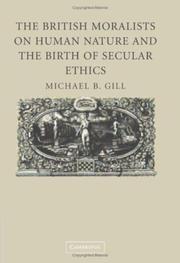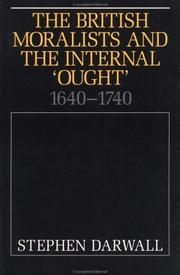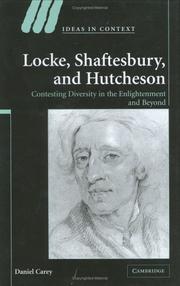| Listing 1 - 7 of 7 |
Sort by
|
Book
Year: 1891 Publisher: Utrecht Beijers
Abstract | Keywords | Export | Availability | Bookmark
 Loading...
Loading...Choose an application
- Reference Manager
- EndNote
- RefWorks (Direct export to RefWorks)
Book
ISBN: 9781350077751 9781350077768 9781350077775 1350077755 Year: 2019 Publisher: London Bloomsbury Academic
Abstract | Keywords | Export | Availability | Bookmark
 Loading...
Loading...Choose an application
- Reference Manager
- EndNote
- RefWorks (Direct export to RefWorks)
Providing a gateway to a new history of modern aesthetics, this book challenges conventional views of how art's significance developed in society.The 18th century is often said to have involved a radical transformation in the concept of art: from the understanding that it has a practical purpose to the modern belief that it is intrinsically valuable. By exploring the ground between these notions of art's function, Karl Axelsson reveals how scholars of culture made taste, morals and a politically stable society integral to their claims about the experience of nature and art. Focusing on writings by two of the most prolific men of letters in the 18th century, Joseph Addison (1672-1719) and the third Earl of Shaftesbury (1671-1713), Axelsson contests the conviction that modern aesthetic autonomy reoriented the criticism and philosophy originally prompted by these two key figures in the history of aesthetics. By re-examining the political relevance of Addison and Shaftesbury's theories of taste, Axelsson shows that first and foremost they sought to fortify a natural link between aesthetic experience and modern political society.
Shaftesbury, of, Anthony A.C. --- Addison, Joseph --- Aesthetics --- Taste --- Political science --- Political aspects --- Philosophy --- Addison, Joseph, --- Shaftesbury, Anthony Ashley Cooper, --- Aesthetics - Political aspects --- Taste - Philosophy --- Political science - Philosophy --- Addison, Joseph, - 1672-1719 --- Shaftesbury, Anthony Ashley Cooper, - comte, - 1671-1713

ISBN: 9780521852463 0521852463 9780511499272 9780521184403 0511225687 9780511225680 9780511226250 051122625X 9780511224386 0511224389 0511499272 1280541326 9781280541322 1107165407 0511322852 0511225059 0521184401 Year: 2006 Publisher: Cambridge Cambridge University Press
Abstract | Keywords | Export | Availability | Bookmark
 Loading...
Loading...Choose an application
- Reference Manager
- EndNote
- RefWorks (Direct export to RefWorks)
Uncovering the historical roots of naturalistic, secular contemporary ethics, in this 2006 volume Michael Gill shows how the British moralists of the seventeenth and eighteenth centuries completed a Copernican revolution in moral philosophy. They effected a shift from thinking of morality as independent of human nature to thinking of it as part of human nature itself. He also shows how the British Moralists - sometimes inadvertently, sometimes by design - disengaged ethical thinking, first from distinctly Christian ideas and then from theistic commitments altogether. Examining in detail the arguments of Whichcote, Cudworth, Shaftesbury, and Hutcheson against Calvinist conceptions of original sin and egoistic conceptions of human motivation, Gill also demonstrates how Hume combined the ideas of earlier British moralists with his own insights to produce an account of morality and human nature that undermined some of his predecessors' most deeply held philosophical goals.
General ethics --- anno 1600-1699 --- anno 1700-1799 --- Great Britain --- Ethics --- Ethics, Modern --- History --- History of philosophy --- Shaftesbury, of, Anthony A.C. --- Masham, Damaris Cudworth --- Whichcote, Benjamin --- Hutcheson, Francis --- Hume, David --- Deontology --- Ethics, Primitive --- Ethology --- Moral philosophy --- Morality --- Morals --- Philosophy, Moral --- Science, Moral --- Philosophy --- Values --- Arts and Humanities

ISBN: 0521451671 0521457823 0511608950 Year: 2003 Publisher: Cambridge Cambridge University Press
Abstract | Keywords | Export | Availability | Bookmark
 Loading...
Loading...Choose an application
- Reference Manager
- EndNote
- RefWorks (Direct export to RefWorks)
This book is a major work in the history of ethics, and provides the first study of early modern British philosophy in several decades. Professor Darwall discerns two distinct traditions feeding into the moral philosophy of the seventeenth and eighteenth centuries. On the one hand, there is the empirical, naturalist tradition, comprising Hobbes, Locke, Cumberland, Hutcheson, and Hume, which argues that obligation is the practical force that empirical discoveries acquire in the process of deliberation. On the other hand, there is a group including Cudworth, Shaftesbury, Butler, and in some moments Locke, which views obligation as inconceivable without autonomy and which seeks to develop a theory of the will as self-determining.
Philosophy, British --- Ethics, Modern --- Ethics --- Philosophie britannique --- Morale moderne --- Morale --- History --- Histoire --- #GBIB:Overlegcentrum Christelijke Ethiek --- 17 <09> --- Geschiedenis van de moraal --- 17 <09> Geschiedenis van de moraal --- General ethics --- anno 1600-1699 --- anno 1700-1799 --- Great Britain --- Philosophy [British ] --- 18th century --- Ethics [Modern ] --- 17th century --- History of philosophy --- Shaftesbury, of, Anthony A.C. --- Butler, Joseph --- Hobbes, Thomas --- Masham, Damaris Cudworth --- Culverwell, Nathaniel --- Hutcheson, Francis --- Hume, David --- Locke, John --- Arts and Humanities --- Philosophy

ISBN: 9780521845021 0521845025 9780511490453 9780521117463 0511137214 9780511137211 0511135041 9780511135040 0511490453 1107152046 9781107152045 1280422157 9781280422157 0511183488 9780511183485 0511201435 9780511201431 0511311656 9780511311659 0521117461 Year: 2006 Volume: 74 Publisher: Cambridge Cambridge University Press
Abstract | Keywords | Export | Availability | Bookmark
 Loading...
Loading...Choose an application
- Reference Manager
- EndNote
- RefWorks (Direct export to RefWorks)
Daniel Carey examines afresh the fundamental debate within the Enlightenment about human diversity. Three central figures - Locke, Shaftesbury, and Hutcheson - questioned whether human nature was fragmented by diverse and incommensurable customs and beliefs or unified by shared moral and religious principles. Locke's critique of innate ideas initiated the argument, claiming that no consensus existed in the world about morality or God's existence. Testimony of human difference established this point. His position was disputed by the third Earl of Shaftesbury who reinstated a Stoic account of mankind as inspired by common ethical convictions and an impulse toward the divine. Hutcheson attempted a difficult synthesis of these two opposing figures, respecting Locke's critique while articulating a moral sense that structured human nature. Daniel Carey concludes with an investigation of the relationship between these arguments and contemporary theories, and shows that current conflicting positions reflect long-standing differences that first emerged during the Enlightenment.
General ethics --- Locke, John --- Hutcheson, Francis --- Shaftesbury, of, Anthony A.C. --- Benefices [Ecclesiastical] --- Beneficies [Kerkelijke ] --- Bénéfices ecclésiastiques --- Church benefices --- Enlightenment --- Graces [Expectative] --- Lumières (Philosophie) --- Lumières [Siècle des ] --- Pluralism (Benefices) --- Siècle des Lumières --- Verlichting (Filosofie) --- Enlightenment. --- Pluralism. --- Locke, John, --- Shaftesbury, Anthony Ashley Cooper, --- Hutcheson, Francis, --- Pluralism --- Monadology --- Monism --- Philosophy --- Reality --- Aufklärung --- Eighteenth century --- Philosophy, Modern --- Rationalism --- Anthony, --- Cooper, Anthony Ashley, --- Shaftsbury, Anthony Ashley Cooper, --- Sheftsberi, Ėntoni Ėshli Kuper, --- Shaftesbury, Anthony Ashley Cooper --- Philanthropus, --- Lokk, Dzhon, --- Lūk, Jūn, --- Lo-kʻo, --- Locke, Giovanni, --- Lock, --- Lock, John, --- Rokku, Jon, --- לוק, י׳ון, --- Arts and Humanities --- History
Book
ISBN: 1438449380 9781438449388 9781438449371 1438449372 Year: 2014 Publisher: Albany, N.Y. State University of New York Press
Abstract | Keywords | Export | Availability | Bookmark
 Loading...
Loading...Choose an application
- Reference Manager
- EndNote
- RefWorks (Direct export to RefWorks)
"An exploration of philosophical and religious ideas about humor in modern philosophy and their secular implications"--Provided by publisher.
Life. --- Wit and humor. --- Bons mots --- Facetiae --- Humor --- Jests --- Jokes --- Ludicrous, The --- Ridiculous, The --- Wit and humor, Primitive --- Literature --- Joking --- Laughter --- Life --- Philosophy --- Shaftesbury, Anthony Ashley Cooper, --- Hamann, Johann Georg, --- Kierkegaard, Søren, --- Kierkegaard, Søren --- Anti-climacus --- H. H. --- Hamann, J. G. --- Haman, Yohan Geʼorg, --- האמאן, יוהאן גיאורג, --- Anthony, --- Cooper, Anthony Ashley, --- Shaftsbury, Anthony Ashley Cooper, --- Sheftsberi, Ėntoni Ėshli Kuper, --- Wit and humor --- Kierkegaard, Søren. --- Shaftesbury, of, Anthony A.C. --- Hamann, Johann Georg --- Anti-Climacus, --- Bogbinder, Hilarius, --- Chʻi-kʻo-kuo, --- Climacus, Johannes, --- Constantius, Constantin, --- Eremita, Victor, --- Haufniensis, Vigilius, --- Johannes, Climacus, --- Johannes de Silentio, --- Kʹerkegor, Seren, --- Kierkegaard, S. --- Kierkegaard, Severino, --- Kierkegaard, Søren Aabye, --- K'i︠e︡rkegor, Sʹoren, --- Kīrkajūrd, Sūrīn, --- Kirkegaard, Soeren, --- Kirkegor, Seren, --- Ḳirḳegor, Sern, --- Kirkegors, Sērens, --- Kirukegōru, Søren, --- Kjerkegor, Seren, --- Kʻo-erh-kʻai-ko-erh, --- Notabene, Nicolaus, --- Silentio, Johannes de, --- Sūrīn Kīrkajūrd, --- Victor, Eremita, --- Vigilius, Haufniensis, --- קירקגור, סרן --- קירקגור, סורן --- קירקגור, סירן --- קירקגור, סירן, --- קירקגורד, סרן, --- 克尓凯郭尓,
Book
ISBN: 0691220530 9780691220536 9780691182551 Year: 2021 Publisher: Princeton, N.J. Princeton University Press
Abstract | Keywords | Export | Availability | Bookmark
 Loading...
Loading...Choose an application
- Reference Manager
- EndNote
- RefWorks (Direct export to RefWorks)
The relaxing of censorship in Britain at the turn of the eighteenth century led to an explosion of satires, caricatures, and comic hoaxes. This new vogue for ridicule unleashed moral panic and prompted warnings that it would corrupt public debate. But ridicule also had vocal defenders who saw it as a means to expose hypocrisy, unsettle the arrogant, and deflate the powerful. 'Uncivil Mirth' examines how leading thinkers of the period searched for a humane form of ridicule, one that served the causes of religious toleration, the abolition of the slave trade, and the dismantling of patriarchal power.
Ridicule. --- Enlightenment. --- Enlightenment --- Shaftesbury, Anthony Ashley Cooper, --- Great Britain. --- Great Britain --- History. --- Aufklärung --- Eighteenth century --- Philosophy, Modern --- Rationalism --- England --- History --- Burke. --- Edmund Burke. --- English Enlightenment. --- Francis Hutcheson. --- Henry Sacheverell. --- Hobbes. --- Humean skepticism. --- Jeremy Waldron. --- Lawrence Klein. --- Leviathan. --- Perils of False Brethren. --- Protestantism. --- Scottish Enlightenment. --- Scottish abolitionists. --- Shaftesbury and the Culture of Politeness. --- The Harm in Hate Speech. --- Thomas Hobbes. --- comedy. --- cultural history. --- dissolute mirth. --- feminism. --- free speech. --- freedom of speech. --- humor. --- mockery. --- offense. --- politeness. --- politics of toleration. --- public sphere. --- public square. --- religious fanaticism. --- slavery. --- Intellectual life --- Ashley, --- Cooper, Anthony Ashley, --- Shaftesbury, Antony Ashley Cooper, --- Shaftesbury, --- Ṣāpṭspari Pirapu, --- Freedom of speech --- Ridicule --- Political aspects --- Fanaticism --- Free speech --- Liberty of speech --- Speech, Freedom of --- Civil rights --- Freedom of expression --- Assembly, Right of --- Freedom of information --- Intellectual freedom --- Law and legislation --- Pragmatics --- History of civilization --- Shaftesbury, of, Anthony A.C.
| Listing 1 - 7 of 7 |
Sort by
|

 Search
Search Feedback
Feedback About UniCat
About UniCat  Help
Help News
News